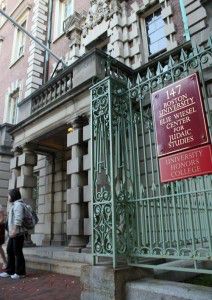
When College of Arts and Sciences history professor Charles Dellheim helped to form the Arvind and Chandan Nandlal Kilachand Honors College, formerly the University Honors College, he said he aimed to stray from the traditional structures of other honors programs.
“Our aim was to do something original and contemporary rather than follow the lead of other fine institutions such as Texas, Michigan, much less Swarthmore,” the KHC director said in an email interview.
Two years later, KHC has 138 students pursuing their liberal arts education and learning to fuse it with their regular courses of study at BU, in hopes of reinforcing a liberal arts foundation in the professional world.
“We are trying to redefine liberal education for a new century by connecting the arts, sciences and professions in novel ways,” Dellheim said. “We see general education as a two-way street: Students of engineering, management and the fine arts benefit from exposure to the humanities, social sciences and natural sciences, and students of the arts and sciences benefit likewise from encountering the subject matter, methods and perspectives of fields such as engineering, management, and the fine arts.”
“The seminars KHC offer definitely [allow] me to venture into areas of education I wouldn’t have even thought of before,” said Lulu Xu, a College of Arts and Sciences freshman.
A biology major on the pre-medical track, Xu said she would normally not consider taking classes outside of her major, but that KHC enables her to stray out of her comfort zone by taking an honors film course.
CAS sophomore Jenny Gilbert, who left the KHC in her first semester of college, said she found it difficult to work around the KHC’s regulations, which only let her study abroad junior year. However, she said she wanted to double major and study abroad in her sophomore year.
“I’m actually in International Relations now. It’s funny that it would have worked out,” she said.
Gilbert said, however, that she does not regret leaving because she had more academic freedom and could take classes such as public health and bioethics.
“To be honest, I’m definitely happy with my decision,” she said. “I wouldn’t have been able to discover those if I had been in the Honors College.
KHC program administrator Amanda Scobie meets with current students to help them balance their KHC and major requirements, as well as with prospective students to determine whether the program is right for them. If students find that they do not enjoy or belong in the KHC, she said, they will have trouble being happy or successful.
“This isn’t a traditional honors program,” Scobie said. “A lot of schools have honors programs, … but this one focuses on liberal arts and research.”
KHC encourages students to study various disciplines, from law to public health, to “develop a well-rounded education.”
The goal, she said, is for students to gain that liberal arts foundation and apply it to what some may say is a more “marketable” field.
“Our courses aim to show students how people are doing research in their day-to-day lives,” she said.
CAS freshman Jonathan Duskin said the seminars also provide insight for topics discussed in his classes outside of KHC.
“I have learned things in my bioethics seminar that were relevant to my neuroscience class and things in my writing studio that were relevant in my philosophy class,” Duskin said.
Some students, such as Duskin, said that while the seminars are useful, balancing seminars and co-curricular activities with their other BU courses can be hard to manage.
“Thus far it has been a little difficult, but definitely manageable,” Duskin said. “My seminar gives much less work than most of my other classes … I’ve felt that as long as I stay on top of my work, then finding time to do everything is very doable.”
“The KHC seminars are just another class for me so I don’t see it conflicting in any way with my other classes,” Xu said.
Scobie said she acknowledges that managing co-curricular activities and seminars can be challenging, depending on the classes the students take, but that the knowledge they gain from those events makes the time commitment worth it.
“The benefit of it definitely outweighs what the inconvenience it might cost for students,” Scobie said.
“Our paramount concern is making Kilachand Honors College as good as it possibly can be. This requires continual assessment,” Dellheim said. “One of the many advantages of being a small program with a minimum of bureaucracy is that we can, and do, make changes when we see the opportunity to improve academic quality.”















































































































